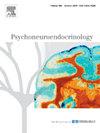Longitudinal effects of pregnancy on PTSD symptoms in black female participants: Moderation by sexual trauma and progesterone
IF 3.6
2区 医学
Q2 ENDOCRINOLOGY & METABOLISM
引用次数: 0
Abstract
Black pregnant females experience disproportionately higher rates of post-traumatic stress disorder (PTSD) and associated health complications, which may be exacerbated by exposure to sexual trauma. Hormonal fluctuations during pregnancy, including progesterone, may also play a key role in modulating PTSD symptoms. The current study assessed how PTSD symptoms change over pregnancy and how sexual trauma and progesterone independently impact the trajectory of PTSD symptoms in a sample of under-resourced pregnant Black females. Participants (N = 283) completed up to three interviews assessing PTSD symptoms over pregnancy; the enrollment interview assessed pre-pregnancy trauma history. Progesterone concentrations were measured in a subset of participants (N = 91). Results from linear mixed models showed that PTSD symptoms decreased over the course of pregnancy, Β= -0.34, p<.001, and that sexual trauma exposure was associated with higher initial PTSD symptoms, Β = 12.11, p<.001, and a significant decrease in PTSD symptoms across pregnancy, Β = -0.48, p = .002. Individuals with no sexual trauma exposure did not show significant change in PTSD symptoms across pregnancy, Β =-0.14, p = .207. This pattern was observed for total PTSD symptoms and all symptom clusters. In the subset of participants with progesterone data, higher progesterone levels, relative to gestational age, was associated with a greater decrease in PTSD symptoms over pregnancy, Β =-0.01, p = .049. The current findings indicate that individuals with a history of sexual trauma demonstrate higher levels of PTSD symptoms early in pregnancy and suggest that PTSD symptoms may decrease over pregnancy via increasing progesterone levels.
怀孕对黑人女性PTSD症状的纵向影响:性创伤和黄体酮的调节作用
黑人孕妇患创伤后应激障碍(PTSD)和相关健康并发症的比例不成比例地高,这可能因暴露于性创伤而加剧。怀孕期间的荷尔蒙波动,包括黄体酮,也可能在调节创伤后应激障碍症状中发挥关键作用。目前的研究评估了创伤后应激障碍症状在怀孕期间的变化,以及性创伤和黄体酮如何独立影响创伤后应激障碍症状的发展轨迹。参与者(N = 283)在怀孕期间完成了多达三次评估PTSD症状的访谈;入组访谈评估了孕前创伤史。测量一部分参与者的孕酮浓度(N = 91)。线性混合模型的结果显示,PTSD症状在怀孕期间有所减轻,Β= -0.34,p
本文章由计算机程序翻译,如有差异,请以英文原文为准。
求助全文
约1分钟内获得全文
求助全文
来源期刊

Psychoneuroendocrinology
医学-精神病学
CiteScore
7.40
自引率
8.10%
发文量
268
审稿时长
66 days
期刊介绍:
Psychoneuroendocrinology publishes papers dealing with the interrelated disciplines of psychology, neurobiology, endocrinology, immunology, neurology, and psychiatry, with an emphasis on multidisciplinary studies aiming at integrating these disciplines in terms of either basic research or clinical implications. One of the main goals is to understand how a variety of psychobiological factors interact in the expression of the stress response as it relates to the development and/or maintenance of neuropsychiatric illnesses.
 求助内容:
求助内容: 应助结果提醒方式:
应助结果提醒方式:


